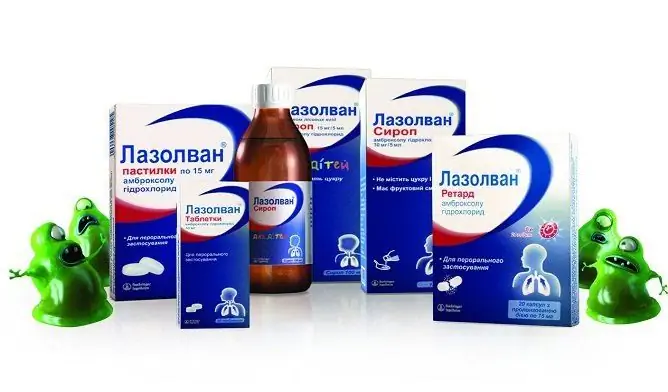- Author Rachel Wainwright wainwright@abchealthonline.com.
- Public 2023-12-15 07:39.
- Last modified 2025-11-02 20:14.
Dry cough in adults: treatment
The content of the article:
-
Treatment tactics
- Eliminating the cause of cough
- Symptomatic treatment
- Inhalation
- Folk remedies
- Features of dry cough
-
Diseases in which dry cough occurs
- Acute respiratory diseases (ARI)
- Flu
- Pleurisy
- Postnasal flow syndrome
- GERD
- Allergy
- Diagnostic methods
- Video
Treatment for dry cough in adults is to eliminate the cause of its development. With severe attacks, symptomatic treatment is prescribed - drugs that suppress cough, stimulate the production of sputum.

Dry cough can be caused by many reasons, before you treat it, you need to find out the reason
Treatment tactics
How to treat a severe dry cough in an adult depends on the cause of its occurrence. Cough is only a symptom of the disease, therefore it is necessary to act on the primary disease. Additionally, drugs are used that reduce the intensity of the symptom, stimulate the production of sputum.
Eliminating the cause of cough
Influencing the cause is the mainstay of dry cough treatment. The choice of medication depends on the underlying disease.
With acute respiratory infections, treatment depends on which microorganism led to the development of the disease - a bacterium or a virus. With a bacterial infection, antibacterial agents are prescribed. Antibiotics from the macrolide or penicillin group are used more often.
With a viral infection (except for influenza), etiotropic treatment is not prescribed. It is enough to drink plenty of fluids and stay in bed. With influenza, antiviral drugs are used in the first 2 days of illness:
- Oseltamivir;
- Zanamivir;
- Remantadine.
For GERD, treatment is aimed at eliminating reflux. For this, medications are used:
- Antisecretory agents - inhibit the secretion of hydrochloric acid. Use drugs from the group of proton pump inhibitors (Omeprazole, Pantoprazole) or histamine blockers (Ranitidine, Famotidine).
- Antacids. For example, Almagel.
- Prokinetics - normalize motor skills. For example, Metoclopramide, Domperidone.
If conservative treatment is ineffective, surgery is indicated.
With the allergic nature of the cough, the action of the allergen must be eliminated. In addition, antihistamines (Suprastin, Loratadin), glucocorticoids are used. During remission, desensitization is used.
With postnasal leakage syndrome, treatment should be comprehensive. The main component of treatment is sanitation of the focus of infection. To do this, use rinsing the nose and nasopharynx, rinsing the throat. For rhinitis and sinusitis, nasal sprays with seawater can be used. For tonsillitis, water with salt, chamomile decoction, Chlorophyllipt are used for rinsing. It is also necessary to use local drugs to relieve swelling. For example, drops Nazivin. If the ENT pathology is bacterial in nature, antibiotics are used. Amoxiclav, Azithromycin are prescribed.

Rinsing the nose with saline may help with postnasal drip syndrome
With pleurisy, treatment tactics depend on the form of the disease and its cause. With exudative pleurisy, a pleural puncture may be prescribed (to evacuate fluid). With a bacterial nature, antibiotics are used, with fibrinous pleurisy - glucocorticoids.
Symptomatic treatment
For dry coughs, drugs can be used that suppress the cough reflex. The indication for the appointment of antitussives is a debilitating, unproductive cough that interferes with sleep and disrupts general well-being.
Centrally acting antitussives are narcotic and non-narcotic. Narcotic drugs are rarely used as they can depress breathing. With a dry obsessive cough in an adult, non-narcotic antitussive drugs are more often used:
- Butamirat (Sinekod);
- Glaucine;
- Oxeladine (Tusuprex).
Peripheral drugs reduce the sensitivity of the airway receptors. Additionally, they act on the muscle layer of the bronchi, expanding their lumen. Peripheral antitussive drugs include Libeksin, Lidocaine.
Additionally, you can use syrups that increase the secretion of phlegm and have an enveloping effect. They are used if the cough is unproductive and does not help clear the airways:
- herbal cough syrup Dr. Mom;
- Alteika syrup;
- syrup Pertussin.
Do not use syrups at the same time as antitussive drugs, this will lead to the accumulation of mucus.
Inhalation
With a dry cough, inhalation is effective. They help moisturize the mucous membranes, which reduces the intensity of the cough.
At home, you can use a nebulizer or steam inhalation.
With a dry cough in an adult, alkaline solutions are used: mineral water, water with soda. A saline solution is suitable for a nebulizer. You can also use mucolytics such as Ambroxol.
Folk remedies
Folk remedies are used as an additional method of treatment. For diseases of the respiratory system, medicinal plants are used:
- marshmallow root;
- liquorice root;
- oregano herb;
- sage leaves;
- chamomile flowers;
- nettle leaves.
Decoctions, infusions and teas are prepared on the basis of medicinal plants.
Before using folk recipes, you need to consult with your doctor.

Folk remedies for coughs can be effective as an adjunct to mainstream therapy
Features of dry cough
Cough is one of the most common reasons for visiting a doctor. Coughing is a reflex that aims to clear the airways.
When the airways are inflamed, mucus is produced, so the cough is moist (with mucus). Dry cough occurs with reflex irritation of the cough receptors. Receptors are located on the mucous membrane of the larynx, trachea, bronchi, and the pleura. An irritant can be:
- dust;
- allergens;
- microorganisms;
- bronchial mucus.
In response to irritation of the cough receptors, the respiratory muscles contract.
A prolonged dry cough loses its protective function and does not help clear the airways.
The duration of a dry cough can be acute and chronic. Acute cough lasts up to 3 weeks, but may disappear gradually over 5-6 weeks. Chronic cough lasts a long time - more than 8 weeks. A prolonged dry cough should alert, as it can be caused by severe pathology.
| Type of cough | Causes |
| Acute |
ARI (acute pharyngitis, laryngitis, tracheitis, bronchitis), influenza Pleurisy Allergic diseases |
| Chronic |
ENT organ pathology: chronic rhinitis, sinusitis, tonsillitis GERD Malignant formations (lung cancer, neoplasms of the mediastinum, lymphogranulomatosis) Tuberculosis of the intrathoracic lymph nodes Enlarged thyroid gland (goiter) |
Diseases in which dry cough occurs
The most common cause of dry cough is respiratory diseases, which are not accompanied by hypersecretion of bronchial mucus. For example, pharyngitis, laryngitis, tracheitis, bronchitis (at 1 week of illness). An unproductive cough can also occur when the lesion is localized outside the respiratory tract - with pleurisy, GERD (gastroesophageal reflux disease), goiter.
Acute respiratory diseases (ARI)
ARI is the most common cause of acute dry cough in adults. This is a group of diseases that are transmitted by airborne droplets. Various viruses and bacteria can be the cause of ARI. Clinically, ARI can manifest itself in the form of:
- pharyngitis - inflammation of the pharynx;
- laryngitis - inflammation of the larynx;
- tracheitis - inflammation of the trachea;
- bronchitis - inflammation of the bronchi.
The onset of cough in acute respiratory infections is associated with irritation of cough receptors located in the mucous membrane of the respiratory tract. With acute respiratory infections, the cough is dry, but its nature may differ, depending on the localization of the inflammation:
- with pharyngitis, compulsive cough, worse in the morning;
- with laryngitis - rough (barking);
- with tracheitis - hacking and painful;
- with bronchitis, the cough is dry only at the onset of the disease, and then becomes wet.
A common symptom of all acute respiratory infections is intoxication syndrome. It is manifested by an increase in body temperature, general weakness. Other symptoms are also present: runny nose, pain and sore throat, hoarseness.
Flu
A dry cough can be caused by influenza, especially during an epidemic (autumn and winter). The flu is caused by specific viruses.
With flu, all symptoms occur acutely, within 1-2 days. Flu cough is rough, painful, accompanied by chest pain. Its appearance is associated with inflammation of the trachea.
Intoxication syndrome comes to the fore with influenza. It is manifested by an increase in body temperature, headache and muscle pain, general weakness and lethargy. There may be intolerance to bright light, loud sounds, and touch.
For influenza, hemorrhagic syndrome is also characteristic: redness of the face, injection of blood vessels of the sclera.

With flu, the general condition of the patient suffers
Pleurisy
With pleurisy, the cough is dry and quiet. A feature is that it disappears in a horizontal position, intensifies with deep breathing.
With pleurisy, cough occurs due to irritation of the cough receptors located in the pleura. Clinical manifestations of pleurisy:
- chest pain;
- dyspnea;
- increased body temperature;
- with exudative pleurisy - a protrusion in the lower part of the chest.
Pleurisy rarely occurs in isolation, more often it is a complication of any disease. By its nature, pleurisy is infectious and non-infectious.
Postnasal flow syndrome
With the pathology of the ENT organs, cough is associated with postnasal flow syndrome. The mucus flows down the back of the throat and irritates the cough receptors located in the mucous membrane. The cough worsens at night and in the morning, which is also associated with mucus drainage. Light coughing may occur throughout the day.
The syndrome of postnasal flow in adults develops with sinusitis, rhinitis, tonsillitis. There are other signs of ENT pathology:
- sore throat;
- nasal congestion, mucous or mucopurulent discharge;
- local pain in the projection of the paranasal sinuses.
In postnasal drip syndrome, the cough is dry, but the person can cough up mucus that runs down the back of the throat.
GERD
The cough in GERD is dry, occurs mainly at night, and intensifies in a horizontal position. Other symptoms are characteristic of GERD:
- heartburn;
- swallowing disorder;
- sour belching;
- chest pain;
- frequent hiccups;
- pain in the abdomen.
The occurrence of a cough is associated with the ingestion of acidic stomach contents into the respiratory tract. This irritates the lining of the larynx and trachea, which leads to the activation of the cough reflex.
Allergy
With allergies, coughing occurs due to irritation of the cough receptors in response to exposure to the allergen. Dust, pollen of plants can act as an allergen.
With allergies, the cough is unproductive, constant, aggravated by contact with the allergen.
Other signs of allergy are also present: watery eyes, mucous nasal discharge, sneezing, skin rashes and itching.
Diagnostic methods
With a dry cough, especially a chronic one, you need to see a doctor. To determine the cause, your doctor will do a physical examination, which includes examining the upper airways (rhinoscopy, pharyngoscopy) and auscultation of the lungs. Further, general clinical studies are assigned - a general blood test, a chest X-ray. If necessary, the doctor conducts targeted diagnostics using narrower research methods.
| Study title | Indications for | results |
| General blood analysis | In all cases | In inflammatory diseases (acute respiratory infections, pleurisy, inflammation of the upper respiratory tract), an increase in the level of leukocytes, the erythrocyte sedimentation rate is determined. With allergies, an increase in the level of eosinophils is determined. |
| Pharyngoscopy | In all cases | With acute respiratory infections, hyperemia of the pharyngeal mucosa is determined. With the pathology of the ENT organs - a strip of mucus on the back of the pharynx. |
| Chest X-ray | For chronic cough | With exudative pleurisy, a darkening in the lower part of the chest with an oblique line is determined. In malignant tumors, focal darkening may occur. |
| Allergy tests, determination of the level of IgE | If you suspect an allergic nature | In case of atopic reactions, skin allergy tests will be positive (for a specific allergen), the IgE level is increased. |
| Palpation and ultrasound of the thyroid gland, determination of thyroid hormones and TSH | If you suspect a goiter | With goiter, an increase in the volume of the thyroid gland (diffuse or nodular), a decrease or increase in the level of thyroid hormones are determined, depending on the cause of the goiter. |
| Esophagogastroduodenoscopy | If you suspect GERD | With GERD, a decrease in the tone of the lower esophageal sphincter, a reflux of gastric contents, and sometimes signs of inflammation of the esophageal mucosa are determined. |
Additional examination is not indicated in all cases. The doctor should determine the need, taking into account the accompanying symptoms and history.
Video
We offer for viewing a video on the topic of the article.

Anna Kozlova Medical journalist About the author
Education: Rostov State Medical University, specialty "General Medicine".
The information is generalized and provided for informational purposes only. At the first sign of illness, see your doctor. Self-medication is hazardous to health!






